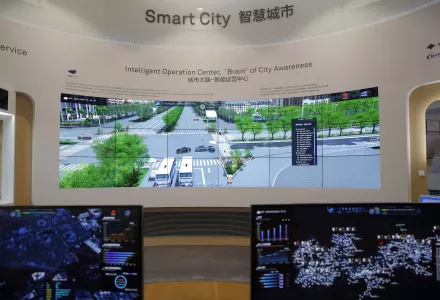
China is developing 500 smart cities — almost half the worldwide total, and more than 10 times North America's figure.
Why it matters: China's smart cities signal the country's strengths not only in technology and infrastructure, but in implementation.
Details: In Canada and the U.S., smart cities face obstacles including skepticism of Big Tech, privacy concerns, outdated infrastructure, and the difficulty of aligning stakeholders.
- The U.S. is developing 40 smart cities, less than 4% of the globe's total.
- In the meantime, over 80 cities and counties in the U.S. are suing the FCC over new rules designed to accelerate the buildout of America's 5G infrastructure, which is expected to be the backbone of advanced internet-of-things technology.
- Alphabet's Sidewalk Labs is attempting to transform a neighborhood in Toronto into "the most innovative district in the world," but hurdles including protests and lawsuits have delayed plans by 6 months, and construction hasn’t begun.
Meanwhile, China's political system and extraordinary rate of rural-to-urban migration work together to fuel the country's full-speed advance.
- China's urbanization offers opportunities to deploy advanced technologies.
- China owns over 60% of the globe's 1.5 billion cellular connections that use the most promising IoT technology standard.
- In Shanghai's Jing'an District, China Telecom has installed more than 500,000 sensors — on everything from fire hydrants to manholes.
- Hangzhou's smart city technologies have reportedly increased traffic speeds by 15% and reduced ambulance arrival time by 50%.
- But China's sensors and cameras also create a data dragnet, offering China's surveillance state unprecedented omniscience.
- China has an estimated 200 million surveillance cameras, while the U.S. has 50 million.
The bottom line: When it comes to building smart city infrastructure, China is at a clear advantage, as many of North America's greatest obstacles are irrelevant for the Chinese government.
Graham Allison is the Douglas Dillon Professor of Government at Harvard University, where he has taught for five decades.
Allison, Graham. “China is Pulling Ahead of North America on Smart Cities.” Axios, July 10, 2019





